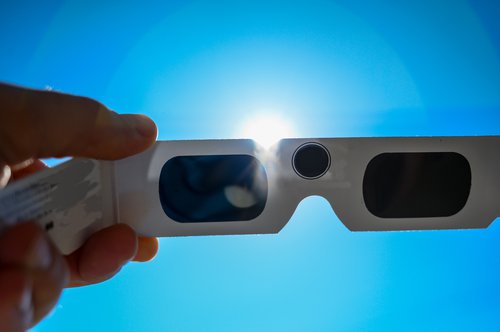Physics Lab Manager Talks All Things Eclipse
On April 8, 2024, Syracuse will witness a rare and splendid event as a total solar eclipse will cast the city into a brief period of daytime darkness. Students, faculty, staff and the community are invited the Shaw Quadrangle (aka ‘the Quad’) for an afternoon of fun, with science demonstrations presented by the College of Arts and Sciences’ Department of Physics.
Ahead of the momentous occasion, Sam Sampere, instructional lab manager with the physics department, shared some tips and background about the rare occurrence of a total eclipse and how to safely enjoy it.
What happens during a solar eclipse?
Sam Sampere (SS): (A total solar eclipse occurs) when the moon is lined up with the sun and is in a special phase, known as the new moon. We can't see the moon during this phase because the part of the moon facing the Earth is not lit up by the sun. On April 8, the moon’s shadow is going to go right across North America and pass through Syracuse.
What is the difference between an annular and total eclipse?
(SS): During an annular eclipse, the moon passes in front of the sun, but the moon is a little farther from the Earth and doesn’t completely block the sun. Annular eclipses are not safe to look at without sun viewing glasses. A total eclipse happens when the moon is very close to the Earth and completely blocks the sun (as it will on April 8, 2024).
How can we safely view the eclipse?

(SS): One thing you can do is order some special eclipse glasses. These are not sunglasses. Please do not view the eclipse through sunglasses, you will damage your eyes. But with eclipse glasses, you can put them on and look at the sun safely and comfortably and not damage your eyes.
* The American Astronomical Society has a list of eclipse glasses manufacturers.
Should we photograph the eclipse with our phones or cameras?
(SS): I strongly recommend that during totality (the moment when the moon completely blocks the sun) you do not take photographs. You want to experience that as much as possible, so don't rely on trying to frame your photograph during totality. As that partial is filling in, go ahead and snap a photograph here and there if you'd like.
If I am going to take a photo with my phone, do you have any advice?
(SS): Do not point your cell phone directly at the sun as that can damage your sensor. What you can do is take your eclipse glasses and hold them over the lens of your camera and snap a photo of the sun. If you have something larger like binoculars or telescopes, you will need a special device for them because you need to filter the light coming into your telescope.
What do you find most interesting about eclipses?
(SS): It's just awe-inspiring. You see these celestial objects dancing in the sky, creating a special event here on Earth. And the fact that we can predict these things is utterly amazing.
Want more eclipse perspectives from A&S faculty? Read the SU News and Syracuse.edu Q&As.
